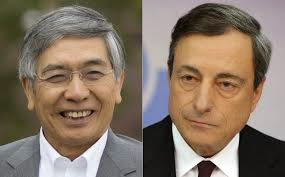The market is generally expecting a dovish FOMC statement. We have argued that it will most likely be little changed, except for modification relating to the asset purchases. Keen interest will be on its references to inflation. Â

While the breakeven rates have fallen, the 5-year/5-year forward which the Fed seems to prefer as a measures of  inflation expectations is little changed. This may be largely explained by looking at relative liquidity. The preferred inflation measure core PCE deflator may remain firm due to housing costs, even if the headline measures of inflation ease due to the sharp drop in energy prices (recall TIPS are tied to headline CPI).
The BOJ is still to meet this week. Here too the market expects a dovish stance, and we are less sanguine.  In testimony to parliament yesterday, Kuroda showed no sign of losing confidence. Data over the last couple of days lifts hopes that the hit from the retail sales tax is waning.  September retail sales jumped 2.7%.  This was three-times more than the Bloomberg consensus. Earlier today, Japan reported September industrial production rose 2.7% compared with the consensus forecast of 2.2%. It completely recoups August’s 1.9% decline.  Â
There is still more data to be reported this week, including unemployment, overall household spending, and CPI. Yet the reports are unlikely to change the BOJ’s enthusiasm to expand QQE. If JPY70 trillion expansion in base money supply does not do the trick, will JPY80, or 90 or even JPY100 work?  While reasonable people can differ, it seems that the bar to that decision is higher than many market participants seem to believe. Â
What brought Japan off course, most recently, was not monetary policy but fiscal policy–the retail sales tax hike. Â Fiscal policy will be the first line of defense. Â This will likely take the form of a supplemental budget. So, while the BOJ may downgrade its growth forecasts, it is unlikely to hint through its forecasts, or more directly with words, that is poised to increase QQE. Instead, officials seem to suggest that they can simply extend the duration of QQE. Some wags would claim the Fed’s third round of asset purchases was QE-Infinity. Maybe QQE is a better candidate. Â

